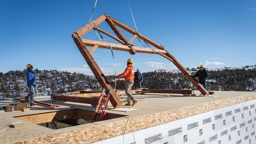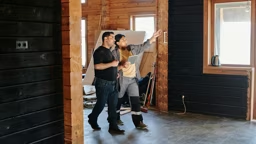
Photo by Daniel McCullough / Unsplash
Some might call it a lull. Others (the smart ones) will describe the time between finalizing construction plans and breaking ground as the period of rattle and hum. In short, things need to happen — quickly. Permits need to be obtained, materials need to be purchased, and subcontractors need to be hired. How much of this do you need to do yourself? All of it … or nothing at all? It depends largely on the relationship you’ve established with your builder or general contractor.
1. What types of permits do I need to get, and do I apply for them or is that the job of my builder or GC?
You’ll need everything from building to mechanical (plumbing, electrical, HVAC) permits. GCs handle permits in different ways. Some will obtain the permit in their names, some in your name and others will leave the permit process to you. Discuss permit procedures and how payment is handled before it’s time to start construction.
Often it’s best to have as much of the permit process handled by your GC as possible. He knows the work schedule for your project and how to deal with inspectors. Since he’s responsible for delivering a house that meets applicable building codes, making him responsible for permits is usually more efficient.
2. What other paperwork often gets overlooked before construction begins, and how do I get a head start on completing it?
Depending on your contract terms, either you or your builder must furnish a site plan prepared by a surveyor. You might want to take charge of this process because most of it takes place long before construction starts.
Contact a surveyor or get a recommendation from your builder. Ask him for a package that includes locating and marking boundaries and road location, site plan, staking the house, septic and well areas, foundation-wall check and final-location survey. Permit authorities and your lender require all or most of these steps. If you obtain a package price from one surveyor, you’ll save time and money.
3. When it comes to building materials other than my timber package, is it better for my general contractor/builder to order them months in advance or wait?
General contractors (GCs) and builders typically have several suppliers with whom they work regularly. They have a good idea of the lead times required to get items to your home site, and they’ll take this into account when scheduling. That said, your builder shouldn’t order materials too far in advance. First, storage space on a job site often is at a premium, so most builders can’t afford to stockpile materials that will sit around collecting dust for several months. Also, your builder will be invoiced for any materials as soon as they’re delivered. Taking delivery on items well before they can be billed out to a client is a practice most builders generally don’t do.
However, an alert builder might hear of a good deal on something needed for your project — say, an awesome kitchen sink — and ask whether you want to purchase it. Then the builder might offer to store the piece for a fee. If you find a good deal on an item, talk to your builder about how to handle shipping, delivery and storage. Heavy items or large quantities may require a forklift or several strong hands, so don’t let delivery come as a surprise.
Hard-to-find items or anything that requires time to acclimate to “normal living conditions” should be ordered far enough in advance to allow for shipping delays or schedule changes. Hardwood flooring, for example, should be allowed to acclimate for at least a week before being installed. But beware: You don’t want to order flooring so far in advance that it gets in the way of construction activities or has to be handled several times before it gets used.
Some items are included in your contractor’s bid, but their cost isn’t specified. For example, your contract may include a $5,000 lighting allowance. If you come across a good lighting sale, buy the lights out of pocket and store them yourself. When the time comes, you can turn over the fixtures to your builder to install. Since you’ve already paid for them, they won’t count toward your lighting allowance.
4. My general contractor assures me that he has the best subcontractors in the state, but I want to make sure they’re first-rate. What steps, if any, can I take to make myself sleep easier at night?
This one is tricky. Your GC is responsible for meeting the terms of your contract. His subcontractors, or “subs,” answer to him — not you. In most cases, the contractor’s bid is based on subs that he’s familiar with and has used on past projects. If he thinks you’ll inject yourself into his construction process, he might withdraw his contract since he can’t be assured that his estimated costs are accurate. As an alternative, he may insist on a time-and-materials contract to cover his added uncertainty and risk.
This doesn’t mean that you have to be stuck with his sub choices if you encounter someone who isn’t working to your expectations, but it’s best to let the GC handle sub management and scheduling. If you become unhappy with shoddy work, simply tell your GC that you aren’t satisfied and can’t release payment until changes are made. The GC can either replace the offender or insist that he make adjustments before being compensated.
The best time to check out subs is when you’re reviewing your GC’s references. Talk to several of the contractor’s previous clients and ask about the subs he used. If someone mentions a sub who was exceptionally good or bad, ask your GC if he will be used in your project.
5. Are there any tools that a homeowner can use to keep organized in the months leading up to construction?
One of the advantages of using a general contractor is that he endures the headaches of scheduling and managing your project. Still, be sure you have an idea of how your project will proceed. There will be some things that you need to do at specific stages of construction, such as choosing lighting and plumbing fixtures, paint and stain colors, cabinets and hardware.
Many builders provide you with an outline of what will be expected of you and when. Others will simply call you when it’s time to make a decision. A journal to record daily activities and remind yourself when deadlines are approaching can be a handy tool. A digital camera or smart phone is a great way to record progress and construction details that will be hidden when the work is complete. Photographing pipes (before trenches are filled) and walls (before wall coverings are installed) will give you a permanent record should you ever need to make repairs or remodel. When your home is complete, your journal and pictures will become the story of your timber home adventure.
See also: Our Checklist for a Smooth Build











